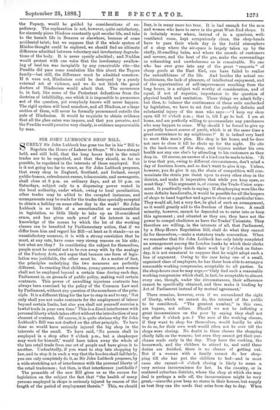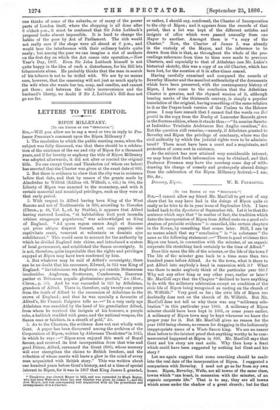SIR JOHN LUBBOCK'S SHOP BILL.
SURELY Sir John Lubbock has gone too far in his "Bill to Regulate the Hours of Labour in Shops." We have always held, and still hold, that the long hours kept in the retail trades are to be regretted, and that they should, as far as possible, be regulated in the interests of those employed. But is it not going too far to enact, as Sir John Lubbock proposes, that every shop in England, Scotland, and Ireland, except public-houses, refreshment-rooms, tobacconists, and newsagents, shall close at 8 p.m. on ordinary days, and at 10 p.m. on Saturdays, subject only to a dispensing power vested in the local authority, under which, owing to local peculiarities, other trades may be added to the excepted instances, and -arrangements may be made for the trades thus specially excepted to obtain a holiday on some other day in the week? Sir John Lubbock is so little of a sensationalist or sentimentalist in legislation, so little likely to take up an ill-considered -craze, and has given such proof of his interest in and knowledge of the means by which the lot of the working classes can be benefited by Parliamentary action, that if we differ from him and regard his Bill—at least as it stands—as an unsatisfactory measure, it is with a strong conviction that he must, at any rate, have some very strong reasons on his side ; but what are they ? In considering the subject for themselves, people must be careful not to be run away with by the analogy of the Factory Acts, and argue that because one form of legis- lation was justifiable, the other must be. As a matter of fact, the principles underlying the two measures are perfectly -different. In enacting that children, young persons, and women shall not be employed beyond a certain time during each day, Parliament is, on grounds of public policy, making void certain contracts. This power of annulling injurious contracts has always been exercised by the policy of the Common Law and by Parliament, without any question of the soundness of the prin- -ciple. It is a different thing for the law to step in and to say, Not only shall you not make contracts for the employment of labour beyond certain limits, but also you shall not yourself exercise a lawful trade in your own time.' This is a direct interference with personal liberty which takes effect without the introduction of any ,element of contract. Of course, it is quite obvious why Sir John Lubbock's Bill was not drafted on the other principle. To have -done so would have seriously injured the big shop in the interests of the small. To have said, No person shall be employed in a shop after 8 o'clock p.m., but a shopkeeper may work for himself,' would have taken away the whole of the late retail trade from one set of people and have given it to -another. Undoubtedly, if you want to stop late shopping by law, and to stop it in such a way that the burden shall fall fairly, you can only completely do it, as Sir John Lubbock proposes, by a wide-stretching act of interference with the personal liberty of the retail tradesmen ; but then, is that interference justifiable ?
The preamble of the new Bill gives us as the excuse for legislation on the subject the fact that "the health of many persons employed in shops is seriously injured by reason of the length of the period of employment therein." This, we should
fear, is in many cases too true. It is bad enough for the men and women who have to serve in the great West-End shops. It is infinitely worse where, instead of in a spacious, well- ventilated room, kept scrupulously clean, the shop-hands have to pass their whole day in the fcetid atmosphere of a shop where the air-space is largely taken up by the stuffy, ill-smelling bales, and where the crowds of customers and servers, and the heat of the gas, make the surroundings as exhausting and unwholesome as is conceivable. No one who has ever gone into any of the great " emporia " of cheap goods at the East End, can have failed to realise the unhealthiness of the life. And besides the actual un- healthiness, the lack of pleasure, of intellectual enjoyment, and of the opportunities of self-improvement resulting from the long hours, is a subject well worthy of consideration, and of equal, if not of superior, importance to the question of physical health and sanitation. These things we admit fully; but then, to balance the continuance of these evils unchecked by legislation, we have to set first the perfectly definite and substantial injury of the man who says :—' I keep my shop open till 10 o'clock p.m.; that is, till I go to bed. I am at home, and am perfectly willing to accommodate any purchasers who may happen to come. Why should I be forced to give up a perfectly honest source of profit, which is at the same time a great convenience to my neighbours ?' It is indeed very hard to meet this man's plea. His shop is his home, and he does not care to close it till he shuts up for the night. He sits in the back-room off the shop, and injures neither his own health nor any one else's by attending to his customers as they drop in. Of course, an answer of a kind can be made to It is true that you, owing to different circumstances, don't mind a day of fourteen hours, and so don't want to give it up. Unless, however, you do give it up, the chain of competition will com- municate the strain you insist upon to every other shop in the district, and make it imperative that while you keep open, so must they.' This argument is, of course, the Trade-Union argu- ment. It practically ends in saying : If shopkeeping were like the more definite handicrafts, it would be possible for all the keepers of shops to band together and agree to close at a particular time. They would all, but a very few, be glad of such an arrangement, as it would greatly add to the freedom of their lives. A small minority, however, cannot be depended on to enter into or keep this agreement ; and situated as they are, they have not the power to compel obedience as have the Trades' Unionists. They therefore are willing, in the interests of all, that Parliament, by a Shop-Hours Regulation Bill, shall do what they cannot do for themselves,—make a statutory trade convention. When we remember that Sir John Lubbock has only lately completed an arrangement among the London banks by which their clerks and other employes finish their work by 2 o'clock on Satur- day, it is not unnatural to suppose that he might adopt such a line of argument. Owing to the case being one of a small, organised class of employers, he has there been able to arrange a reasonable working compromise, acceptable to all parties. In the shop-hours case he may urge,—' Only find such a reasonable working compromise which shall, in fact, be acceptable to almost every one, though, under the circumstances, their adherence cannot be specifically obtained, and then make it binding by Act of Parliament instead of by mutual agreement.'
There remains, however, even if we surrendered the right of liberty, which we cannot do, the interest of the public to be considered. "The greatest number," in this case, are buyers, not sellers. Should we not be inflicting a great inconvenience on the poor by saying they shall not buy after 8 o'clock p.m. ? The men of the working classes, if they want to shop for themselves, would hardly be able to do so, for their own work would often not be over till the shops were closing. No doubt in these classes the shopping chiefly falls on the women ; but even they cannot get their pur- chases made early in the day. They have the cooking, the housework, and the children to attend to, and until these duties are finished, there is no chance of getting out. But if a woman with a family cannot do her shop- ping till she has put the children to bed—and in most cases she cannot-8 o'clock closing is likely to mean a very serious inconvenience for her. In the country, or in scattered suburban districts, where the shop at which she may deal is perhaps a mile off, the inconvenience might be very great,—since the poor keep no stores in their houses, but supply as best they can the needs that arise from day to day. When one thinks of some of the suburbs, or of many of the poorer parts of London itself, where the shopping is all done after 8 o'clock p.m., it must be confessed that Sir John Lubbock's proposal looks almost impossible. It is hard to change the habits of the poor by Act of Parliament. The rich would not really care if the shops were all closed at 6 p.m., and would bear the interference with their ordinary habits quite easily; but among the poor we can imagine a riot of mothers on the first day on which the Act comes into operation,—New Year's Day, 1887. Even Sir John Lubbock himself is not quite happy in the idea of such a disturbance, for his Bill lets tobacconists alone. He probably thinks that the man in search of his tobacco is not to be trifled with. We are by no means sure, however, that the reasoning will not just as much apply to the wife when she wants her tea, soap, and candles, and cannot get them ; and between the wife's inconvenience and the husband's liberty, we doubt if Sir J. Lubbock's Bill does not go too far.



































 Previous page
Previous page